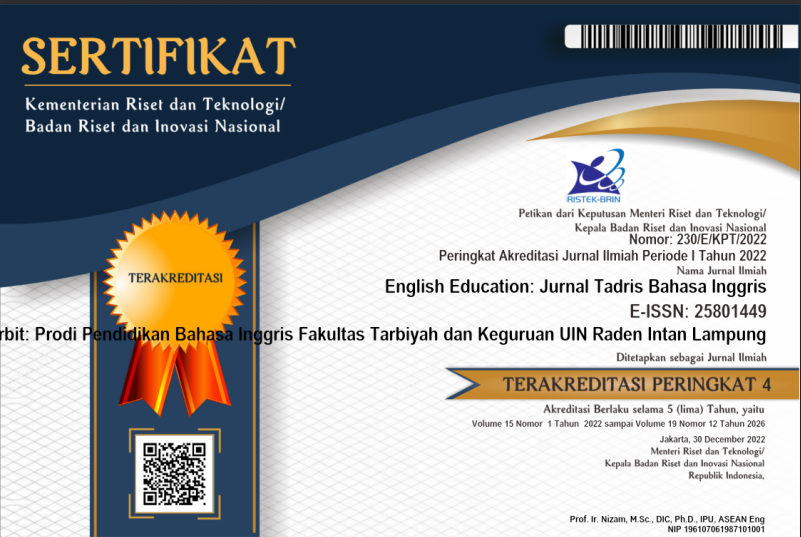Challenges in International Service Learning
Abstract
Full Text:
PDFReferences
Barrera, D., Willner, L. N., & Kukahiko, K. (2017). Assessing the Development of an Emerging Critical Consciousness through Service Learning. Journal of Critical Thought and Praxis, 6(3), 17–35.
Brail, S. (2016). Quantifying the Value of Service-Learning : A Comparison of Grade Achievement Between Service-Learning and Non-Service-Learning Students. International Journal of Teaching and Learning in Higher Education, 28(2), 148–157.
Carnicelli, S., & Boluk, K. (2017). Leisure , Sport & Tourism Education The promotion of social justice : Service learning for transformative education. Journal of Hospitality, Leisure, Sport & Tourism Education, (December 2015), 0–1. https://doi.org/10.1016/j.jhlste.2017.01.003
Cook-Sather, A. (2002). Authorizing Students ’ Perspectives : Toward Trust , Dialogue , and Change in Education. Educational Researcher, 31(4), 3–14.
Darby, A. N., Ward-johnson, F., & Cobb, T. (2016). The Unrecognized Co-Educator In Academic Service-Learning: Community Partners’ Perspectives On College Students Serving Diverse Client Populations. Partnerships: A Journal of Service-Learning & Civic Engagement, 7(1).
Dewey, J. (1916). Democracy and Education. New York: Macmillan.
González-Carriedo, R., López De Nava, J., & Salas Martínez, M. (2017). International student teaching: A transformational experience. Journal of International Students, 7(3), 841–855. https://doi.org/10.5281/zenodo.570037
Hsu, L. (2017). Mind the Gap: Exploring Hospitality Teachers’ and Student Interns’ Perception of Using Virtual Communities for Maintaining Connectedness in Internship. Journal of Education and Training, 4(1), 88. https://doi.org/10.5296/jet.v4i1.10933
Kricsfalusy, V., Zecevic, A., Assanand, S., Bigelow, A., & Gaudet, M. (2016). The Frontiers of Service-Learning at Canadian Universities. Engaged Scholar Journal: Community-Engaged Research, Teaching, and Learning, 2(2).
Krishnan, L. A., Masters, C., & Wang, C. (2017). Structured Study Abroad Enhances Intercultural Competence, 1(1).
Larsen, M. A., & Searle, M. J. (2017). International service learning and critical global citizenship : A cross- case study of a Canadian teacher education alternative practicum. Teaching and Teacher Education, 63, 196–205. https://doi.org/10.1016/j.tate.2016.12.011
Mansker, V., Fulks, R., Peters, B., Curtner, R. M., Fulks, R., Peters, B., & Curtner, R. M. (2010). Learning by Doing : A Case Study of Hospitality Students ’ Learning Experience via Service Learning / Hands-on Experience, (2016).
McElwain, A., Finnegan, V., Whittaker, A., Kerpelman, J., Adler-Baeder, F., & Duke, A. (2016). Evaluation and lessons learned from an undergraduate service learning course providing youth-focused relationship education. Evaluation and Program Planning, 58, 116–124. https://doi.org/10.1016/j.evalprogplan.2016.06.002
Pratt, Y. P., & Danyluk, P. J. (2017). Learning What Schooling Left Out : Making an Indigenous Case for Critical Service-Learning and Reconciliatory Pedagogy within Teacher Education. Canadian Journal of Education / Revue Canadienne de l’éducation, 40(1), 1–29.
Riley, T., & Douglas, S. R. (2016). The Multicultural Café : Enhancing Authentic Interaction for Adult English Language Learners Through Service Learning, 34(11), 25–50.
Schreiner, M. B. (2016). Service-Learning and Disability Simulations : Comparing Their Infl uence on Candidate Teaching Dispositions. International Journal of Research on Service Learning in Teacher Education, 4, 1–8.
Sivalingam, P., & Yunus, M. M. (2017). NURTURING 21 ST CENTURY SKILLS THROUGH SERVICE LEARNING : FROM ISOLATION TO CONNECTION. PEOPLE: International Journal of Social Sciences, 3(1), 346–356. https://doi.org/DOI-https://dx.doi.org/10.20319/pijss.2017.31.346356
Smolcic, E., & Katunich, J. (2017). Teachers crossing borders : A review of the research into cultural immersion fi eld experience for teachers. Teaching and Teacher Education, 62, 47–59. https://doi.org/10.1016/j.tate.2016.11.002
Weber, S. (2017). The Impact of Service Learning on Pre-service Teachers Preconceptions of Urban Education. Journal of Inquiry & Action in Education, 8(2), 21–33.
DOI: http://dx.doi.org/10.24042/ee-jtbi.v11i1.2675
English Education: Jurnal Tadris Bahasa Inggris, UIN Raden Intan Lampung is licensed under a Creative Commons Attribution-ShareAlike 4.0 International License. pISSN: 2083-6003, eISSN: 2580-1449.









